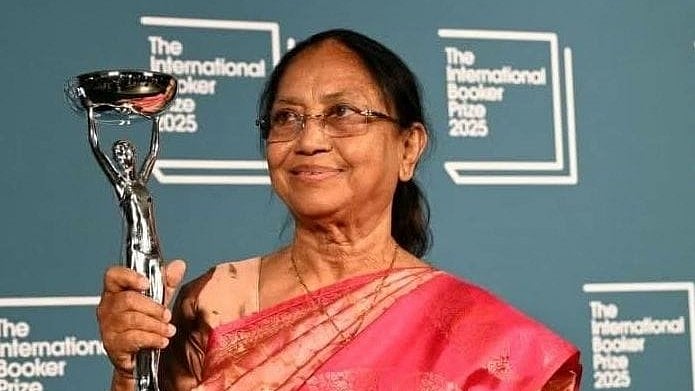
International Booker Prize winner Banu Mushtaq.
Credit: X/@siddaramaiah
Banu Mushtaq’s collection of Kannada short stories, Heart Lamp, translated into English by Deepa Bhasthi, has won the 2025 Booker International Prize—an honour on many counts.
It is not only the first-ever Kannada book to win the coveted award but also the first short story collection to do so. Bhasthi is also the first Indian translator to bag the award.
When Gitanjali Shree’s Tomb of Sand won the award in 2022, it became the first book originally written in an Indian language to win that prize. However, that work was translated by an American, Daisy Rockwell.
Mushtaq and Bhasthi deserve plaudits for their achievements, which are a big boost not only for Kannada and Indian literature but also for South Asia.
With two big awards within a span of three years (Tamil writer Perumal Murugun’s novel Pyre was longlisted in 2023), will global attention finally turn towards Indian literature, enabling more books written in Indian languages to be translated into English and other international languages?
Might it energise a growing ecosystem that is already reshaping Indian publishing?
India’s linguistic diversity is well known. While there are scores of writers producing excellent work in numerous Indian languages, only a small fraction of this literature is translated into English — let alone other languages.
Though regional language literature is rich and prolific, its readership remains largely confined to readers of that language. Hindi books are mostly read by Hindi literate readers; the same goes for Bengali, Marathi, Tamil, Malayalam, Kannada and others. Only a handful of these books are translated, and even fewer reach a global readership. Given the large body of work published in Indian languages, this leaves a lot to be desired.
One of the key challenges is funding. Writers and publishers have repeatedly pointed out the economic infeasibility of translations. “Publishing is a business — they look at return on investment and how to make it viable,” said award-winning Kannada writer Vivek Shanbhag.
With little money in translations — an area where quality is critical — the interest and initiative must come from the translator or the author. Unfortunately, there are few good translators in India and fewer incentives. The work is intellectually demanding, time-consuming and labour-intensive. Finding translators to translate books into Indian languages is a challenge.
Even the Sahitya Akademi set up to promote literature in Indian languages, perhaps, finds it unsustainable to undertake translations. It had launched a project in 2010 called ‘Indian Literature Abroad’ (ILA) with the aim of translating Indian books, but how many Indian language books get translated? Some of the best books, including the Booker-winning ones, are translated privately, not by the Akademi.
The Akademi is doing its bit in promoting Indian literature, but it could do a lot more in getting Indian books translated and offering greater incentives to translators as well as promoting writers and translators.
Moreover, literacy among readers is not uniformly spread across India. Some states, such as Kerala, are literate, and Malayalam books have a large readership, whereas in certain states, such as Uttar Pradesh or Bihar, literacy rates may be lower, and hence readership too is low.
As Malayalam author Benyamin asks, “If my books are selling in thousands, why should I think of translating and getting them published in English?”
But all’s not lost. In the last few years, the translation scene has improved, and publishers have realised that some of the best writing in India is happening in regional languages and hence are translating these works into English. Moreover, translated books have been winning awards. In recent years, winners of the JCB Prize for Literature have been translations. And translated works of Indian writers have bagged the prestigious DSC Prize for South Asian Literature.
The great Rabindranath Tagore won the Nobel Prize for Literature over a hundred years ago in 1913 for his book of poems Gitanjali, originally written in Bengali, a testimony to India’s literary prowess.
It is a sad irony that there is a bias towards English in India and elsewhere, but let’s not forget that English remains the most accessible language globally. Hence, it is imperative that Indian language books must be translated into English first to gain readership and recognition, a view Kannada writer Vasudhendra upholds.
Let’s hope the two big International Booker awards translate into publishers and the government stepping up their efforts to encourage Indian language writers and translate their works so that the exceptional storytelling of Indian writers and the rich literary heritage of India reaches readers globally.
(The writer is a Bengaluru- based independent journalist)